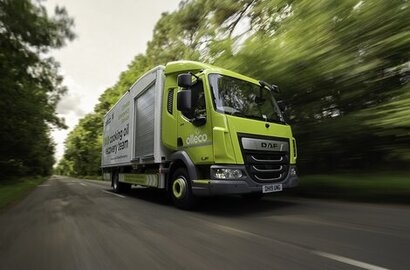
A recent Zemo Partnership study found that an important barrier to uptake was the need for HDV fleet operators to have more clarity in terms of the environmental credentials of renewable fuels, both for company carbon reporting and making decisions on fleet decarbonisation solutions.
While the electrification of cars and vans is now well under way, larger, long-range vehicles and legacy cars and vans will be on the road for the next 20-30 years. Cutting GHG emissions from these vehicles by using renewable fuels remains a key objective as we strive to achieve net zero by 2050.
The RFAS approves companies supplying high blend renewable fuels on the basis of meeting three performance criteria, with evidence verified by an independent auditor complementing the safeguards included in the Renewable Transport Fuel Obligation (RTFO). The assurance criteria are based on life-cycle GHG emissions, feedstock sustainability and supply chain traceability. The scheme is open to companies supplying renewable fuels for use in road vehicles and non-road mobile machinery, including biofuels and hydrogen.
A unique feature of the scheme is a ‘Renewable Fuel Declaration’ which fleet operators receive with batches of the renewable fuel purchase. The declaration includes a colour-coded GHG emission savings banding system, similar to energy efficiency labels, encouraging fleet operators to strive to achieve higher GHG emissions savings. (An example Renewable Fuel Declaration can be found here.)
Zemo Partnership piloted the scheme with several renewable fuel suppliers. Argent Energy and CNG Fuels are now approved under the scheme and Zemo Partnership is working with Green Biofuels Ltd, Air Liquide and Gasrec to enable their approval. All these companies are producing biofuels from waste feedstocks, achieving GHG emission savings of between 80 percent and 90 percent compared with diesel.
“It’s critical that technological interventions to tackle climate change live up to their billing and can demonstrate verifiable life cycle GHG emissions savings and strong sustainability performance in terms of their production” said Gloria Esposito, Head of Sustainability at Zemo Partnership. “With increasing attention being given to Scope 3 emissions in corporate carbon reporting, measures to lower GHG emissions across company supply chains are becoming increasingly important. One of the benefits of the RFAS is that it will provide accurate, robust and transparent renewable fuel GHG emissions data, and assist fleet operator decision making and reporting with regards to choosing sustainable low carbon solutions”.
Zemo Partnership is complementing the launch of the RFAS by publishing an updated Renewable Fuels Guide (co-produced with Cenex, first published in spring 2020). The guide for HDV operators provides an overview of the operational, cost and environmental credentials of different high blend renewable fuels currently available. (Download here.)
To promote these initiatives, Zemo Partnership and the Renewable Transport Fuels Association are running a series of webinars on UK prospects for advanced renewable fuels in road and aviation sectors. The webinars begin today with a focus on advanced gasoline. Further events take place on 25th and 30th March and 1st April.
For additional information:

